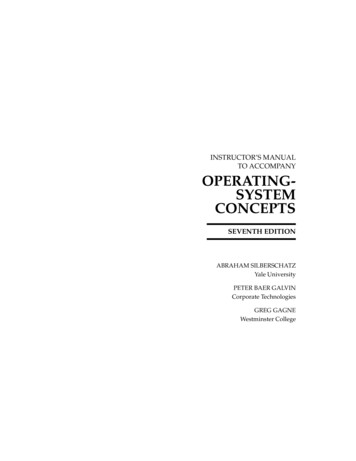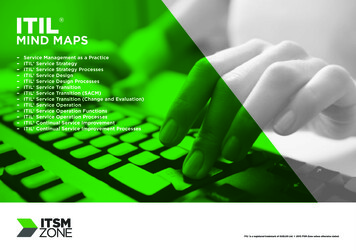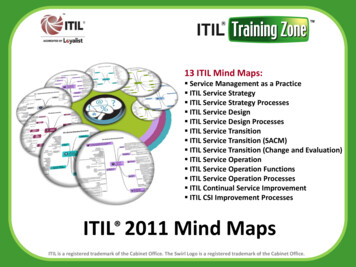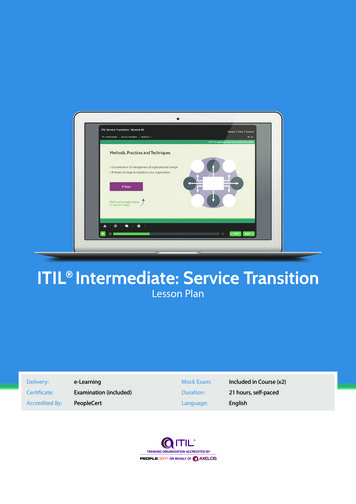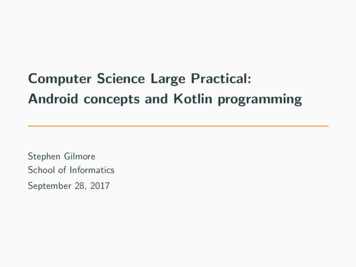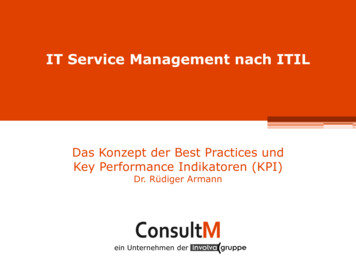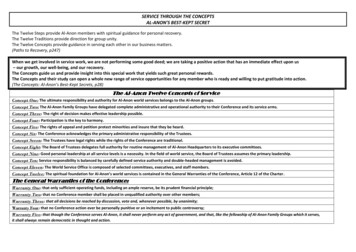
Transcription
SERVICE THROUGH THE CONCEPTSAL-ANON’S BEST-KEPT SECRETThe Twelve Steps provide Al-Anon members with spiritual guidance for personal recovery.The Twelve Traditions provide direction for group unity.The Twelve Concepts provide guidance in serving each other in our business matters.(Paths to Recovery, p247)When we get involved in service work, we are not performing some good deed; we are taking a positive action that has an immediate effect upon us– our growth, our well-being, and our recovery.The Concepts guide us and provide insight into this special work that yields such great personal rewards.The Concepts and their study can open a whole new range of service opportunities for any member who is ready and willing to put gratitude into action.(The Concepts: Al-Anon’s Best-Kept Secrets, p28)The Al-Anon Twelve Concepts of ServiceConcept One: The ultimate responsibility and authority for Al-Anon world services belongs to the Al-Anon groups.Concept Two: The Al-Anon Family Groups have delegated complete administrative and operational authority to their Conference and its service arms.Concept Three: The right of decision makes effective leadership possible.Concept Four: Participation is the key to harmony.Concept Five: The rights of appeal and petition protect minorities and insure that they be heard.Concept Six: The Conference acknowledges the primary administrative responsibility of the Trustees.Concept Seven: The Trustees have legal rights while the rights of the Conference are traditional.Concept Eight: The Board of Trustees delegates full authority for routine management of Al-Anon Headquarters to its executive committees.Concept Nine: Good personal leadership at all service levels is a necessity. In the field of world service, the Board of Trustees assumes the primary leadership.Concept Ten: Service responsibility is balanced by carefully defined service authority and double-headed management is avoided.Concept Eleven: The World Service Office is composed of selected committees, executives, and staff members.Concept Twelve: The spiritual foundation for Al-Anon’s world services is contained in the General Warranties of the Conference, Article 12 of the Charter.The General Warranties of the Conference:Warranty One: that only sufficient operating funds, including an ample reserve, be its prudent financial principle;Warranty Two: that no Conference member shall be placed in unqualified authority over other members;Warranty Three: that all decisions be reached by discussion, vote and, whenever possible, by unanimity;Warranty Four: that no Conference action ever be personally punitive or an incitement to public controversy;Warranty Five: that though the Conference serves Al-Anon, it shall never perform any act of government, and that, like the fellowship of Al-Anon Family Groups which it serves,it shall always remain democratic in thought and action.
“The Concepts provide a method to address issues, hear opinions, and balance the scales between service entities. They offer guidance on how to avoid certain business andprogramme pitfalls while leaving enough room for growth and interpretation, always reminding us that our business is different. Our business is based on a spiritualprogramme. We aim for spiritual growth for the greatest number rather than financial gain, power or prestige for a few.”(The Concepts [P-57], p3)INTROSPECTION – MEDITATIONIn Al-Anon it always comes back to the individual. How do the Concepts affect us on a personal level? While ours is a program for individuals, we still need others to nurtureour growth. Our whole program is based on group sharing. Without the group, where would we be? Only through the love and support of others struggling for the sameanswers do we find strength to go on. We recognise the importance of basic principles such as: the need for participation, the spirit of mutual respect, the role of our trustedservants, and the inspired nature of group conscience.We know from our meeting experience the value of each member of the group and acknowledge how deeply we rely on all who are present. We hear the individual voicewhen it is carried on through our service structure. No matter where, each member’s voice is heard; it is valued through the wisdom available in the three Legacies: Recovery,Unity, Service.(Al-Anon’s Best-Kept Secrets, p28)The Al-Anon Twelve Concepts of Service (South Africa)Concept One: The ultimate responsibility and authority for Al-Anon General Services belongs to the Al-Anon groups.Concept Two: The Al-Anon Family Groups have delegated complete administrative and operational authority to their General Service Conference and its service arms.Concept Three: The right of decision makes effective leadership possible.Concept Four: Participation is the key to harmony.Concept Five: The rights of appeal and petition protect minorities and insure that they be heard.Concept Six: The Conference acknowledges the primary administrative responsibility of the General Service Board.Concept Seven: The Board Members have legal rights while the rights of the Conference are traditional.Concept Eight: The General Service Board delegates full authority for routine management of Al-Anon General Service Office to its General Service Committee.Concept Nine: Good personal leadership at all service levels is a necessity. In the field of General Service, the General Service Board assumes the primary leadership.Concept Ten: Service responsibility is balanced by carefully defined service authority and double-headed management is avoided.Concept Eleven: The General Service Office is composed of General Service Committee and staff members.Concept Twelve: The spiritual foundation for Al-Anon’s General Service Office is contained in the General Warranties of the Conference, Article 12 of the Charter.The General Warranties of the Conference:Warranty One: that only sufficient operating funds, including an ample reserve, be its prudent financial principle;Warranty Two: that no Conference member shall be placed in unqualified authority over other members;Warranty Three: that all decisions be reached by discussion, vote and, whenever possible, by unanimity;Warranty Four: that no Conference action ever be personally punitive or an incitement to public controversy;Warranty Five: that though the Conference serves Al-Anon, it shall never perform any act of government, and that, like the fellowship of Al-Anon Family Groups which it serves,it shall always remain democratic in thought and action.
Service ObstaclesWarped sense of responsibility andauthority.Lack of confidence in chosen/delegatedrepresentative.Solution/sIsolation (lack of interaction), superior andinferior as well as them and us exclusion,fear of making a mistake, self-doubt.Fear of being unheard, being rejected, fearof retaliation or revenge.Let go of control, develop trust and grant authority.Carry our share and allow others to carry theirs.Allow the chosen representatives (Conference) and servicearms (portfolio holders) to be accountable for operationalmatters.Job descriptions, delegate responsibility, provide theknowledge (share information), provide the What and Whyand allow the How to use knowledge decision making.Encourage participation and interaction, create anatmosphere of belonging and respect. Recognise thatbelonging is a spiritual need.Be considerate to the person speaking and listen, create anatmosphere of we all matter (democracy).Lack of knowledge – what works.Lack of understanding – why it works.Lack of experience – how it works.Learn and understand what is good business, understandhow Al-Anon works traditionally and operationally. Askquestions, listen to answers.Lack of harmony and consideration due tolack of understanding roles andresponsibilities, mutual trust.Get lost in the endless details of routine,unable to have an overview, use oldperspective on new conditions.Personal ambition and self-gratification,dominance, dictating (strong personality),passing the buck, blaming others.Confusion in role and responsibility, lack ofcommunication, lack of delegation,imbalance between responsibility andauthority.Isolating, lack of coordination, cooperation,and communication. Inequality and lack of acommon goal.Fear-based decisions, lack of planning,irresponsible counsel, short-sighteddecisions, misguided pride and manipulationof outcome.Understand roles and responsibilities. Work together ingood faith with mutual trust.Lack of confidence, knowledge and servicesponsorship – lack of mutual (shared) trust.Delegate the administrative responsibilities. Take on theoversight role, maintaining an overview.Practice good judgement and be responsible, be openminded and stable yet flexible.Clearly defined job and the authority (mandate) to do it,understand the concept of balanced authority andaccountability. Do your job and no one else’s, know when tostop and when to stand up for your rights.Creating and affirming a common goal. Respecting we eachhave a part to play, operating in fairness, consulting andallowing participation. Finds the common ground – balance.Reason things out (discussion), participate and ask for othersto participate, lead by example, demonstrate democraticabove bureaucratic behaviour.ConceptThe sharing of responsibility and authority expands the everwidening circles (One).This is the democratic & spiritual framework of our fellowshipas Conference is a group conscience as delegates and servicemembers are nominated and voted for by the groups (Two).Choose carefully for each position and trust the job to bedone without interference (meddling) and undue criticism(Three).Respectful, self-disciplined consideration will give everyonethe right to participate which assures harmony (Four).No tyranny (dictatorship) for majority or minority. Becourteous and considerate to build strength, unity andcooperation (Five).Trustees are expected to spearhead the formulation of AlAnon policy in accordance with the principles and areaccountable for proper execution. Effective businessoperations best achieve spiritual objectives (Six).Legal and traditional rights need never clash or be seen asopposing rights, rather that both work together to becomeone and service flows out for all (Seven).Keep the day-to-day chores up to date. Plan the future withwisdom. Insure continuity (Eight).Note and review special characteristics that make goodservice leaders. Good personal leadership in an example thatinspires others to follow (Nine).Relationships are harmonious when persons know exactlywhat their area of operation is and how much leeway isallowable for individual initiative. Service responsibility isbalanced (Ten).Correlating (connecting) good spiritual practice with goodbusiness demonstrates how Al-Anon principles should operatein all our affairs (Eleven).Through establishing the prudent middle ground between fearand recklessness, we can achieve effective harmony. Throughspiritual practice we find the freedom to live courageouslyand joyously (Twelve).
UNITY THROUGH THE TRADITIONS".when we try to control others, we lose the ability to manage our own lives." (Paths to Recovery)CONFLICT RESOLUTION USING THE TRADITIONSUnity – Our common goal:Tradition One: Our common welfare should come first; personal progress for the greatest number depends upon unity.a)b)In what ways can I contribute to the unity in my group? [P-92]In what ways does Tradition One help me to recognise the value of others, as well as myself?Group Conscience – Mutual respect:Tradition Two: For our group purpose there is but one authority – a loving God as He may express Himself in our group conscience. Our leaders are but trusteda)b)servants – they do not govern.In what ways does my relationship with a Higher Power help me to be respectful of others? [P-92], p73Once I express my opinion, how do I let go of my expectation that I will get my way? [P-92], p74Our common bond – Singleness of purpose:Tradition Three: The relatives of alcoholics, when gathered together for mutual aid, may call themselves an Al-Anon family group, provided that as a group, theya)b)have no other affiliation. The only requirement for membership is that there be a problem of alcoholism in a relative or friend.What keeps me from feeling that I am fully part of any group in which I participate? [P-92], p79How do I give each newcomer a warm and loving welcome?Autonomy – Freedom with balance:Tradition Four: Each group should be autonomous except in matters affecting another group or Al-Anon or AA as a whole.a)b)How can we be sure we are not trying to force solutions to please individuals?How does listening to others help me make responsible decisions?One primary purpose – Having compassion and understanding:Tradition Five: Each Al-Anon Family Group has but one purpose, to help families of alcoholics. We do this by practising the Twelve Steps of AA ourselves, bya)b)encouraging and understanding our alcoholic relatives, and by welcoming and giving comfort to families of alcoholics.How can we show kindness and compassion to (i) each other and (ii) to ourselves, even when we disagree?Do I remember Al-Anon’s primary purpose (to help friends and families of alcoholics) in my service activities? How does this affect my actions? [B-24], p174One spiritual aim – Cooperation without affiliation:Tradition Six: Our family groups ought never endorse, finance or lend our name to any outside enterprise, lest problems of money, property and prestige divert usa)b)from our primary spiritual aim. Although a separate entity, we should always co-operate with AA.Does my group have CAL prominently displayed? How do I use CAL in my personal recovery?How can we cooperate with each other while still respecting and maintaining individuality?Abundance – Everything we need is available:Tradition Seven: Every group ought to be fully self-supporting, declining outside contributions.a)How does loving detachment help me find a better balance between giving support to someone else and taking care of myself?
b)In what ways am I fully self-supporting, rather than expecting others to rescue me?Our personal experience – Knowing our roles:Tradition Eight: Al-Anon Twelfth Step work should remain forever non-professional, but our service centres may employ special workers.a)b)How often do I participate in discussion with those I love, allowing my opinions to be heard and extending the same courtesy to others, even when they disagree withme?Do I feel the need to look good or to be a perfect model of recovery? Does that stop me from being humble enough to get the help I need?Structure with flexibility – Working together:Tradition Nine: Our groups, as such, ought never be organized; but we may create service boards or committees directly responsible to those they serve.a)b)Do we encourage every member to participate, and how does that allow us to rotate service positions?How do I treat those who serve us? Do I appreciate and support them or do I criticise and second-guess them?Keep the Al-Anon focus – Let go of outside issues:Tradition Ten: The Al-Anon Family Groups have no opinion on outside issues; hence our name ought never be drawn into public controversy.a)b)When have I allowed public controversy, drama or gossip to affect my personal relationships?How can I find ways to say what I mean without being mean when I say it?Attraction, not promotion – Humility:Tradition Eleven: Our public relations policy is based on attraction rather than promotion; we need always maintain personal anonymity at the level of press, radio,a)b)films, and TV. We need guard with special care the anonymity of all AA members.Am I attracting others to my new way of life or am I trying to convince them to change? How?How can I talk about my recovery without revealing the identity of the alcoholics in my life?Principles above personalities – Our spiritual foundation:Tradition Twelve: Anonymity is the spiritual foundation of all our Traditions, ever reminding us to place principles above personalities.a)b)How can we listen to the principles in others’ messages, instead of reacting to their personalities?In which ways can I practise anonymity without becoming invisible?
RECOVERY THROUGH THE STEPSAt one of my Al-Anon meetings I heard an interesting way to categorize the 12 steps into 4 groups. Giving up, Owning up, Making up and Keeping up.(Hope for Today, p74)1. Giving upStep One: We admitted we were powerless over alcohol – that our lives had become unmanageable.Step Two: Came to believe that a Power greater than ourselves could restore us to sanity.Step Three: Made a decision to turn our will and our lives over to the care of God as we understood Him.How does my idea of ‘control’ affect my concept of a Higher Power?2. Owning upStep Four: Made a searching and fearless moral inventory of ourselves.Step Five: Admitted to God, to ourselves and to another human being the exact nature of our wrongs.Step Six: Were entirely ready to have God remove all these defects of character.How can working Steps 4-6 help to make changes that can bring more happiness into my life?3. Making upStep Seven: Humbly asked Him to remove our shortcomings.Step Eight: Made a list of all persons we had harmed, and became willing to make amends to them all.Step Nine: Made direct amends to such people wherever possible, except when to do so would injure them or others.Which tools can I use to maintain a good relationship with loved ones?4. Keeping upStep Ten: Continued to take personal inventory and when we were wrong promptly admitted it.Step Eleven: Sought through prayer and meditation to improve our conscious contact with God as we understood Him, praying only for knowledge of His will for us andthe power to carry that out.Step Twelve: Having had a spiritual awakening as the result of these steps, we tried to carry this message to others, and to practise these principles in all our affairs.How am I living the message of the programme or how am I a good example of Al-Anon recovery?Thought for the day: “Sometimes the ‘It’ in ‘Keep it simple’ can be the program itself’”(Hope for Today, p74)
AL-ANON'S BEST-KEPT SECRET The Twelve Steps provide Al-Anon members with spiritual guidance for personal recovery. The Twelve Traditions provide direction for group unity. The Twelve Concepts provide guidance in serving each other in our business matters. (Paths to Recovery, p247)

